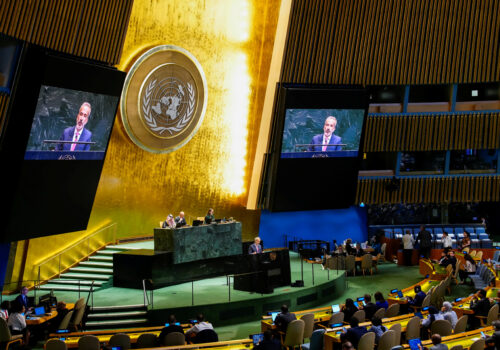How Trump can drive an end to the war in Gaza
In the face of a Gaza crisis that is worsening and not nearing resolution, US President Donald Trump’s passivity is baffling. It’s time for him to lean in on steps that can move the war closer to its end. As he considers a possible visit to Israel next month, here’s what he should do to make that visit a success.
As the Israel Defense Forces (IDF) prepare to implement Prime Minister Benjamin Netanyahu’s plan to take control of Gaza City, Israeli society is riven between those who want to continue the war until Hamas is completely defeated and those who, demonstrating in the streets by the hundreds of thousands, are calling for an end to the war and a deal to bring all Israeli hostages held by Hamas home. Meanwhile, humanitarian conditions in Gaza continue to be appalling and are set to worsen still as the Israeli operation expands. On the international front, Israel’s isolation deepens by the day.
Trump deserves credit for helping achieve the hostage deal that was reached during the transition between US administrations. But since then, he has contributed significantly to the worsening of the war, and he has missed opportunities to hasten its end. His proposal to build a “Riveria of the Middle East” in Gaza emboldened extremist Israeli politicians who Netanyahu depends on—Finance Minister Bezalel Smotrich and National Security Minister Itamar Ben-Gvir—to push for full reoccupation, resettlement, and annexation. Trump evidently raised no objection to Israel’s cutoff of international aid shipments into Gaza in March that brought on a hunger crisis. He failed to use the momentum of successful Israeli and US strikes on Iran’s nuclear program as a pathway to declare victory. And now, he expresses no concern over an ill-founded and, many fear, ill-fated expanded Israeli military campaign. He has seemingly endorsed it: “We will only see the return of the remaining hostages when Hamas is confronted and destroyed!!!” Trump wrote Monday on social media. “The sooner this takes place, the better the chances of success will be.”
Trump has unique influence with the prime minister, and scarcely any of the political constraints that have affected his predecessors in dealing with Israel.
Israel’s own confusion about the actual purpose, strategy, duration, and end state of the expanded operation should raise alarm bells. The Israeli cabinet’s decision, initially advertised as a plan for full occupation of the Gaza Strip, in the end only applies to Gaza City, not the Hamas strongholds of central Gaza, where Israeli hostages are likely held. Even with this limitation, the IDF opposed the plan, arguing that it would endanger hostages, cost many soldiers’ lives, and strain Israel’s exhausted reserve forces. But there is no logic to a campaign stopping in Gaza City, and even that would require the evacuation of several hundred thousand Palestinian civilians and likely cause significant casualties. The clear implication is that, twenty-two months in, the cabinet has signed Israel up for many more months of war.
The actual goal of this operation is murky. Is it to free hostages? The IDF expects them to be killed. Is it to destroy Hamas? Many experts expect a long-term Israeli occupation, fighting a perpetual insurgency. Is it to hand over control of Gaza to Arab states and non-Hamas Palestinians? Netanyahu has ruled out a role for the Palestinian Authority, the very condition Arab states set for their participation. Is it to return Israel to permanent control of Gaza, expelling or exiling the Palestinian population? Netanyahu says no to the first, and that Palestinians should leave voluntarily. Smotrich’s answers to both run the other way.
Only the United States is capable of pressing Israel—in the spirit of friendship, support for its security, and shared loathing of Hamas—to carefully think through the merits of its operations. There is no sign such conversations are taking place.
Even a narrow focus on US interests should raise significant questions for the Trump administration. Is it in the US interest for Israel to become increasingly isolated, as Western allies impose arms transfer limitations and line up to recognize a Palestinian state? Is it in the US interest for the exhausted IDF, after military successes on multiple fronts, but with the danger that some of the fronts could reignite, to be bogged down in an endless occupation and counterinsurgency in Gaza? Is it in the US interest for Arab states to withdraw from willingness to play any role in their shared interest in removing Hamas from power in Gaza, because they won’t be seen as abetting this Israeli operation? Is it in the US interest to see the promise of expanded regional integration and Saudi normalization with Israel slip away?
Netanyahu does leave open the slim possibility of a negotiated end to the war. His conditions are the release of all hostages, the disarmament of Hamas, the demilitarization of the Gaza Strip, the maintenance of Israeli security control over Gaza, and the establishment of a governing entity that is neither Hamas nor the Palestinian Authority that is prepared to live in peace with Israel. But now, with a two-stage deal to release hostages and end the war—which has long been Netanyahu’s preference—seemingly available, he is insisting on a deal that meets all of these conditions up front.
It is absolutely righteous to seek the return of all hostages, the removal of Hamas from power, and the prevention of further threats from Gaza. But Netanyahu links those claims to other, unattainable goals, and in the process sets up his own people and Palestinians in Gaza for significantly prolonged suffering.
Wars end messily. There is rarely a perfect outcome. Since at least 1973, virtually no Arab-Israeli war has ended without a US-scripted off-ramp. It is almost a requirement for an Israeli prime minister to be able say to his or her citizens, “I was forced to accept these less-than-perfect terms by the president of the United States.” Netanyahu himself has often relied on this tool.
Judging by his diplomacy on Ukraine, Trump understands that wars end in less-than-perfect outcomes. But the United States and Israel are also able to work together to script the end state as a victory. The dismantling of Hamas as a military force; the return of the remaining hostages; the commitment of Arab states to work to exile remaining Hamas leaders and fighters and assist in a peaceful reconstruction of Gaza; a US recognition of Israel’s right to continue to strike Hamas in Gaza as it does Hezbollah in Lebanon. These are the makings of a messy win, which is far preferable to an endless, bloody stalemate, with Israel reviled in much of the world. As he has in the past, Netanyahu may end up missing the moment to get the best available terms, and he may be forced to scramble to recover worse terms later.
How can Trump change the dynamic?
It starts with direct talks with Netanyahu. Trump has unique influence with the prime minister and scarcely any of the political constraints that have affected his predecessors in dealing with Israel. Little more than a clear statement that he expects the war to end would shift Netanyahu’s strategy.
Also needed are frank military-to-military conversations between the IDF and US Central Command. Now under the command of Admiral Brad Cooper, US Central Command is known to be a friendly and sympathetic partner to Israel. But it can also provide a professional reality check on the wisdom of the planned operation and suggest alternatives that avoid risks to hostages, civilians, and soldiers, while still imposing pressure on Hamas.
The United States should join efforts to intensify negotiations on a final hostage deal to end the war. Special Envoy to the Middle East Steve Witkoff, also carrying Iran and Ukraine duties, is spread too thin. There needs to be a full-time senior US envoy on the case.
News that Turkey has joined Qatar and Egypt in trying to reenergize negotiations holds potential. Trump should immediately engage Turkish President Recep Tayyip Erdoğan, whose sympathy for Hamas, long a source of frustration, could now be leveraged to pressure the terrorist group to release all hostages and accept exile. These requirements must be communicated as essential US interests, conveyed to a NATO ally, and an opportunity to upgrade US-Turkish ties. Simultaneously, it may be time to strip Qatar of its lead role in the talks, with Egypt or Turkey in the lead, and call for the expulsion of Hamas leaders from Qatar.
Negotiations will take time, and even a final deal will be implemented in phases. Meanwhile, the United States and Israel should agree on facilitating a sustained surge of humanitarian aid into Gaza, which could include an expansion of the Gaza Humanitarian Foundation’s efforts, sustained provision of aid by international organizations, and the resumption of the flow of commercial goods.
Finally, Trump should demand clarity from Arab states on the steps that they are prepared to take now and in the day-after phase. These steps should include demanding and facilitating the exile of remaining Hamas leaders and fighters and participation in a post-conflict security force. They should also include support for Palestinian Authority-affiliated governing and security personnel to return to Gaza. Arab states should also help finance Gaza’s reconstruction while ensuring disarmament and preventing the diversion of building materials for non-civilian use.
A narrow opportunity exists to avoid stretching the Gaza tragedy into 2026. Trump needs to seize it.
Daniel B. Shapiro is a distinguished fellow with the Atlantic Council’s Scowcroft Middle East Security Initiative. He served as US ambassador to Israel from 2011 to 2017, and most recently as deputy assistant secretary of defense for Middle East policy. He also previously served as the director of the Atlantic Council’s N7 Initiative.
Further reading
Fri, Aug 8, 2025
Israel’s gamble in Gaza City signals a push toward negotiation—but risks a long insurgency
New Atlanticist By Alex Plitsas
Israel’s decision to occupy Gaza City is aimed at ending its war with Hamas. But without careful planning, it risks starting a new conflict against a brewing insurgency.
Thu, Aug 7, 2025
Why Gaza’s post-Hamas future depends on its Arab neighbors—not just Israel
MENASource By
The international community is likely to support—both ideologically and financially—a local or Arab-led post-war solution for Gaza.
Fri, Aug 1, 2025
Diplomatic momentum for recognizing a State of Palestine is growing. Here’s what to know.
New Atlanticist By
France, the United Kingdom, Canada, Portugal, and several other countries have said they may recognize a State of Palestine at the UN General Assembly in September.
Image: July 7, 2025, Washington, District of Columbia, USA: President Donald Trump hosts a bilateral dinner for Israeli Prime Minister Benjamin Netanyahu, Monday, July 7, 2025, in the Blue Room. (Credit Image: ? Daniel Torok/White House/ZUMA Press Wire) REUTERS


